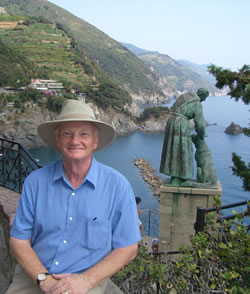|
I've noticed there aren't many good books about writing short literary fiction. (There are plenty on writing thrillers, fantasy, science fiction, even mainstream novels.) At one point, I thought I might write one myself, but the literary-fiction writers I work with don't often read books about writing, though they do better than that: they read literary fiction voraciously.
Here are a few of the things they do find profitable:
- Copy out sections or whole stories they love. (It's "play and mastery"—we know it as children, as we know joy and passion in creative work, though we often block it as adults)
- Slapdash-outline stories they want to learn from. (Harry Crews, for instance, copied out longhand and outlined all of the novels of Graham Greene, and F. Scott Fitzgerald imitated a different famous writer every six months in his 20's.)
- Hemingway's favorite exercise--which was to take a favorite scene from another writer's novel, try to recreate it in words as close as possible to the original, and compare the two versions. Every writer I've ever known who's tried this has been blown away by it. You learn instantly, among many other things, whether you're an underwriter or overwriter, a visual writer or an audial one, and have an ear for dialogue or prefer summarizing speech.
- Writer's exercises. As an exercise, "write some dialogue" does nothing, really—certainly not dramatically or by way of character-revelation under pressure. On the other hand, "Write a dialogue scene with minimal exposition where two people are arguing, but we have no idea about what, and we have to play deceptive in a major way to figure it out" has success built into it--just as "write about something cute and innocent and very safe, but with a subtle, threatening feel—an undercurrent of horror to it"—does. Two of my favorites, passed down to me years ago through the writer's grapevine, are "The Black Unicorn" and "Fairytale for an Imaginary Child." Anyone who'd like to see these need simply email me through my website and say, "Send those two writer's exercises."
And on and on.
I continue to be stunned by how well these things work. But why should I be stunned? This is how artists have always learned their craft—studying other great work. Young writers are afraid they'll lose their voices, themselves, to the apprenticeship, but that's just not possible when one chooses the works to emulate out of love.
One of the greatest threats to young writers are these Neo-romantic notions of what it means to be a writer:
- I'm a born writer, therefore don't do exercises (how beneath me)
- What lands on the page is art (either the reader gets it or doesn't)
- I certainly don't want to embrace another's writing, even if I love it, because I might lose my originality. (Only in the US—because of cultural American myths—do writers fear being "overinfluenced" by what for millennia artists have viewed simply as their craft apprenticeships.)
End of sermon from a man who taught university too long and now gets to lecture one-on-on new writers (and quite a few established ones, it turns out—we published writers can get lazy, non-embracing-of-what-we-love and isolated, too.)
Now, aren't you sorry you asked?
|


